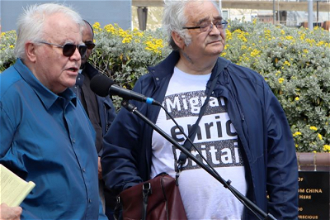Salford: 'Modern Slavery - Breaking the Chains'

Credit: Diocese of Salford
With latest reports showing a growing number of people both around the world and in the UK at risk of modern slavery, Caritas Salford and the Diocese of Salford have launched a new initiative to further help stop modern slavery in all its forms in communities in Greater Manchester and Lancashire.
A special pilot 'Modern Slavery: Breaking the Chains' session, which was run in partnership with the Santa Marta Group, Greater Manchester Police and the Medaille Trust, saw 41 attendees gather together on Friday 10 May to be trained in understanding the risks of Modern Slavery and how to address them and support those affected. The training took place at the Cathedral Centre in Salford and was a pilot session.
Attendees were welcomed by Bishop John Arnold, the Bishop of Salford. He said: "Our churches and schools are often the first place that people experiencing the crime of slavery turn to for support. In the Diocese of Salford we have made a firm commitment to tackling modern slavery in all its forms and to support people affected at a time they need it most, a journey we have been committed to for some years. This is a subject Pope Francis called 'a crime against humanity' and we all know that we simply cannot sit back and do nothing while so many people are suffering in such terrible ways. Our parishes and churches should be a sanctuary for those who need it and working alongside Caritas Salford, and our partners at the Medaille Trust, Santa Marta Group and Greater Manchester Police, we want to protect the human dignity of every person. Everyone deserves to feel safe and secure and it's all of our duties to be aware of how we can help others to do that. In fact, we must all not just be aware, but also speak out and take action to help."
Patrick O'Dowd, director of Caritas Salford, said: "This new training, which we are hoping can be rolled out more widely to other communities and organisations, is a vital next step in a range of activities we've been carrying out in recent years as we attempt to combat modern slavery in our diocese. We know that this is a huge global problem happening right now and sadly the true number of people experiencing the trauma of modern slavery is unknown, but the Global Slavery Index estimates 40 million people worldwide and 136,000 in the UK. It's a problem that isn't just happening miles away from our own homes, but right here in our local communities and parishes and that's why it's so important that we are more aware and able to recognise the signs of modern slavery and human trafficking. We need to know what steps we can take to support those who are experiencing it."
Pauline Morgan, the Chief Operating Officer of the Diocese of Salford, said: "The diocese and associated charities and organisations have already taken significant steps to highlight slavery and to cut the risk of exposure in our supply chains, how we invest and in our local communities. This training is the next important stage in this work and we hope it will further empower people to take practical action in tackling modern slavery across our diocese and beyond. It's vital we take real, tangible action and all commit to making change that saves lives."
Miriam Cakebread, policy and network officer at Santa Marta Group, said: "It was a delight to present at Caritas Salford's first 'Breaking the Chains' event. There was a real sense that the Church and Caritas care deeply about, and are ready to mobilise against, the scourge of modern slavery and human trafficking in our communities. Thank you for the opportunity to be involved - we feel energised and inspired by the group's engagement and look forward to developing our links with this network in the future."
The Diocese of Salford and Caritas Salford have already been working to tackle Modern Slavery in their communities by providing pastoral and practical support to survivors, providing shelter and other forms of assistance to help people rebuild their lives, taking steps to ensure that goods and services procured by the Church are free from slave labour by implementing supply chain monitoring mechanisms and supporting fair trade initiatives. They have also been collaborating with police, statutory agencies and other charities to help identify and support survivors and establish partnerships to enhance anti-slavery efforts.
Contact: Matt Yates, Parish and Communities Engagement Co-ordinator, Caritas Salford modernslavery@caritassalford.org.uk.


















